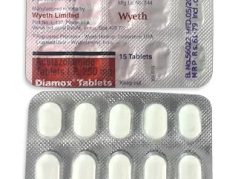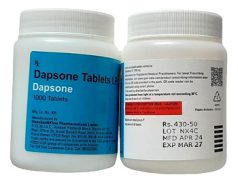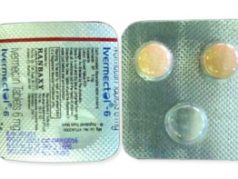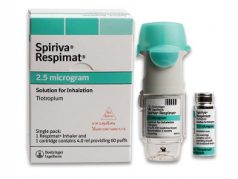Nintedanib

Nintedanib
- Nintedanib can be purchased in our pharmacy without a prescription, with delivery available throughout Australia. Discreet and anonymous packaging is provided.
- Nintedanib is used for the treatment of idiopathic pulmonary fibrosis (IPF) and other interstitial lung diseases. It acts as a protein kinase inhibitor, targeting pathways involved in fibrosis.
- The usual dosage of nintedanib is 150 mg taken orally twice daily, with the option to reduce to 100 mg twice daily if poorly tolerated.
- The form of administration is in capsules.
- The effect of the medication begins within a few days, but it may take several weeks to see the full benefit.
- The duration of action is approximately 12 hours.
- It is advised to avoid alcohol while taking nintedanib due to potential interactions and increased side effects.
- The most common side effect is diarrhoea, which is very common and dose-dependent.
- Would you like to try nintedanib without a prescription?
Basic Nintedanib Information
- International Nonproprietary Name (INN): Nintedanib
- Brand names available in Australia: Ofev
- ATC Code: L01XE31
- Forms & dosages: 100 mg, 150 mg film-coated capsules
- Manufacturers in Australia: Boehringer Ingelheim
- Registration status in Australia: Prescription-only (Rx)
- OTC / Rx classification: Prescription-only
Critical Warnings & Restrictions
Understanding the critical warnings and restrictions associated with nintedanib is crucial, especially for specific high-risk groups like the elderly, pregnant women, and individuals with chronic illnesses. These factors play a significant role in determining suitability for this medication. Proper awareness can aid in preventing severe side effects, ensuring patient safety.
High-Risk Groups (Elderly, Pregnancy, Chronic Illness)
For the elderly, the likelihood of experiencing adverse effects from nintedanib increases due to potential comorbidities and polypharmacy. Given that this group may already be on multiple medications, close monitoring is essential. Elderly patients often showcase a heightened susceptibility to:
- Diarrhea
- Elevated liver enzymes
- Other gastrointestinal disturbances
Pregnant women should avoid nintedanib due to its teratogenic potential; this medication can severely impact fetal development.
Individuals with chronic illnesses, particularly those with moderate to severe liver impairment (Child-Pugh B or C), must steer clear of nintedanib, given the elevated risks of complications. Patients with a history of cardiovascular events or gastrointestinal issues need careful consideration and monitoring when prescribed this medication.
Interaction With Activities (Driving, Workplace Safety Under Australian Law)
Nintedanib can induce side effects that may interfere with essential activities such as driving or operating machinery. Given the potential for symptoms like dizziness, nausea, and severe gastrointestinal issues, it’s crucial to assess how these effects might impact workplace safety. Australian law mandates that individuals must not engage in activities that pose a risk to themselves or others if they are unfit to do so due to medication effects.
Patients are advised to consult their healthcare providers about driving or working with heavy machinery post-medication, especially in the early stages of treatment when the body is still adjusting.
Q&A — “Can I Drive After Taking It In Australia?”
In Australia, it is advised to refrain from driving until you know how nintedanib affects you. Many individuals report side effects that could impair driving ability. Always consult your healthcare provider for personal guidance.
Access & Purchase Options
Securing nintedanib in Australia is straightforward, with various avenues for access and purchase available for patients. Understanding where to obtain this medication is essential for managing conditions like idiopathic pulmonary fibrosis (IPF) and other related diseases.
National chains (Chemist Warehouse, Priceline, TerryWhite)
Nintedanib, marketed as Ofev, can be found in major pharmacy chains such as Chemist Warehouse, Priceline, and TerryWhite across Australia. These well-known national retailers provide convenience for patients seeking prescription medications. Typically, nintedanib is available in 100 mg and 150 mg capsules, making it easily accessible for those in need of antifibrotic treatment.
Online pharmacies and telehealth e-prescriptions
In today’s digital age, obtaining prescriptions through telehealth has become increasingly popular. Patients can consult healthcare professionals online for evaluations, and e-prescriptions for nintedanib can often be sent directly to affiliated online pharmacies. This option offers a convenient way to purchase nintedanib from home, ensuring that patients receive their treatment without unnecessary hurdles.
Mechanism & Pharmacology
Understanding how nintedanib works biologically is essential for patients and healthcare providers. This medication plays a significant role in managing fibrotic diseases by targeting specific pathways in the body.
Simplified explanation
Nintedanib inhibits certain proteins that contribute to fibrosis, primarily by blocking tyrosine kinase receptors. By doing so, it reduces the progression of fibrosis in the lungs, helping to preserve lung function. This action translates into potential improvements in breathing and quality of life for those affected by conditions like IPF.
Clinical terms
In clinical terms, nintedanib acts as a "tyrosine kinase inhibitor," targeting pathways associated with fibrosis and angiogenesis. It prevents the transformation of cells that lead to excessive scar tissue formation. The drug's mechanism is central in managing diseases characterised by progressive fibrosing interstitial lung disease (PF-ILD) and systemic sclerosis-associated ILD.
Indications & Off-Label Uses
Nintedanib is primarily used for specific approved medical conditions, but there are also discussions around its off-label applications within Australian healthcare.
Approved indications by TGA
The Therapeutic Goods Administration (TGA) in Australia has approved nintedanib for the treatment of various conditions such as:
- Idiopathic Pulmonary Fibrosis (IPF)
- Systemic Sclerosis-Associated Interstitial Lung Disease (SSc-ILD)
- Progressive Fibrosing Interstitial Lung Disease (PF-ILD)
This approval highlights the role of nintedanib in managing conditions that lead to lung scarring and dysfunction, promoting patient care in Australia.
Off-label uses in Australian clinical practice
In addition to its TGA-approved uses, nintedanib is sometimes administered off-label for other fibrotic diseases or related conditions. Clinicians may consider it in cases where traditional treatments are not effective, based on emerging research and individual patient needs.
Key Clinical Findings
Recent studies (2022-2025) reveal substantial findings related to nintedanib's effectiveness and safety. Research conducted both in Australia and internationally has significantly contributed to understanding its role in treating lung fibrosis.
Key findings indicate that nintedanib slows the decline of lung function in patients with IPF and reduces the rate of acute exacerbations. These results foster confidence in nintedanib as a frontline therapy for managing these progressive conditions.
Alternatives Matrix
Patients may seek alternatives to nintedanib based on their individual health profiles and treatment responses. Understanding these options can aid in making informed decisions.
PBS-listed alternatives comparison table
| Medication | Indication | Dosage Form | Common Side Effects |
|---|---|---|---|
| Nintedanib (Ofev) | IPF, SSc-ILD, PF-ILD | Capsules 100 mg, 150 mg | Diarrhoea, nausea, elevated liver enzymes |
| Pirfenidone (Esbriet) | IPF | Capsules, film-coated tablets | Diarrhoea, rash, fatigue |
Pros and cons checklist
Choosing between nintedanib and other treatments like pirfenidone can be challenging. Here’s a quick overview:
- Pros of Nintedanib: Effective in slowing lung function decline, manageable side effects.
- Cons of Nintedanib: Diarrhoea, potential liver enzyme elevation.
- Pros of Pirfenidone: Alternative option with a different side effect profile.
- Cons of Pirfenidone: Risk of rash, drug interactions.
Common Questions
During pharmacy consultations in Australia, many patients have similar questions about nintedanib. Here are some of the most common inquiries:
- How long does nintedanib take to work? Patients often wonder when they can expect to see improvements. Nintedanib typically shows effects after a few weeks of consistent use.
- What are the side effects of nintedanib? Commonly reported side effects include diarrhea, nausea, and elevated liver enzymes. Understanding these helps manage expectations.
- Can nintedanib be taken with other medications? This is crucial since nintedanib has a potential for drug interactions. Consulting healthcare providers is essential before starting any new medications.
- What is nintedanib's mechanism of action? Nintedanib works as a tyrosine kinase inhibitor, affecting pathways that contribute to fibrosis.
- Is nintedanib suitable for everyone? Not every patient can use nintedanib. Possible contraindications include moderate to severe hepatic impairment and known hypersensitivity.
- How does nintedanib compare to pirfenidone? Patients often want to know about nintedanib vs pirfenidone and their respective effectiveness for treating idiopathic pulmonary fibrosis.
Suggested Visual Content
Creating engaging infographics can elevate understanding and awareness of nintedanib. Suggested types of visual content include:
- PBS pricing information: A clear breakdown of costs associated with nintedanib under the Pharmaceutical Benefits Scheme.
- Pharmacy network distribution: A map or chart showcasing pharmacies across Australia that dispense nintedanib.
- Dosage guidelines: A simple visual guide for patients outlining recommended dosages and adjustments.
Registration & Regulation
TGA approval
Nintedanib has undergone a thorough regulatory process to gain Therapeutic Goods Administration (TGA) approval in Australia. Its approval came in the late 2010s following extensive clinical trials, demonstrating its efficacy in treating idiopathic pulmonary fibrosis and other interstitial lung diseases. The Australian market primarily sees it branded as Ofev, available in capsule form.
PBS subsidy details
Under the Pharmaceutical Benefits Scheme (PBS), nintedanib is subsidised for eligible patients diagnosed with specific fibrosing conditions. The PBS ensures that patients can access nintedanib at a significantly reduced cost compared to the full price, making it more affordable for ongoing treatments.
Storage & Handling
Household storage in Australian climate (heat/humidity)
In Australia, where temperatures can soar, proper storage of nintedanib is vital. Keep nintedanib below 25°C, away from direct sunlight and moisture. It's best stored in its original packaging to maintain potency and prevent spoilage due to humidity and heat.
Cold-chain handling for pharmacies
Pharmacies must adhere to strict cold-chain handling protocols to ensure nintedanib remains effective. This includes storing products within a temperature-controlled environment during transportation and display. Regular checks on storage conditions help safeguard product integrity.
Guidelines for Proper Use
Australian pharmacist counselling style
Australian pharmacists typically provide thorough counselling to patients regarding nintedanib usage. This includes discussing potential side effects, the importance of adherence to dosing schedules, and what to do in case of a missed dose. They also ensure patients understand when to seek medical advice, particularly concerning gastrointestinal symptoms.
Patient advice from PBS and national health authorities
The national health authorities provide guidelines for nintedanib use, reinforcing its effectiveness and safety. Patients are advised to participate in regular monitoring to watch for adverse effects like elevated liver enzymes and to adhere closely to prescribed dosages. It’s also essential for patients to keep their healthcare provider informed of any other medications they are taking, especially concerning immunosuppression.
| City | Region | Delivery time |
|---|---|---|
| Sydney | NSW | 5–7 days |
| Melbourne | VIC | 5–7 days |
| Brisbane | QLD | 5–7 days |
| Perth | WA | 5–7 days |
| Adelaide | SA | 5–7 days |
| Hobart | TAS | 5–9 days |
| Canberra | ACT | 5–7 days |
| Newcastle | NSW | 5–9 days |
| Gold Coast | QLD | 5–9 days |
| Sunshine Coast | QLD | 5–9 days |
| Geelong | VIC | 5–9 days |
| Wollongong | NSW | 5–9 days |
| Cairns | QLD | 5–9 days |
| Central Coast | NSW | 5–9 days |
| Townsville | QLD | 5–9 days |








